CONTENTS
Fell Asleep Leading off 2B
Surprise Series At-Bat
McGraw's Big Blunder
He Should Eat Barbecue Every Night
Yankee-Red Sox Clashes – I
Yankee-Red Sox Clashes – II
Lou's Lost Hits
Two HRs And They Pinch-Hit for Me!
If All Else Fails, Try Humor
58 Innings in Three Days
Baseball Lore –
I
Baseball Lore – II
Baseball
Lore – III
Baseball
Lore – IV
Baseball
Lore – V
Baseball
Lore – VI
Baseball
Lore – VII
Baseball
Lore – VIII
Baseball
Lore – X
Baseball
Lore – XI
Baseball
Magazine
Golden Rankings Home
Top of Page
|
Bits of Baseball Lore - IX
Fell Asleep Leading off 2B
"Ol' Pete" Browning batted .341 in 13 seasons in the American Association and National League from 1882-1894. Pete's achievement is especially remarkable because he stayed drunk, on and off the field, most of the time.
- A severe case of mastoiditis as a child left him almost completely deaf. Alcohol was his painkiller of choice. He usually kept a flask inside his uniform shirt during games.
- In 1887, while playing for the Louisville Colonels of the American Association, Pete missed the first game of a series in Cincinnati because he was "too intoxicated to find his way to the train."
- Still drunk, Browning arrived for game two and doubled. He proceeded to take a 15-foot lead off second and fell asleep. The 2B "walked up and put him out, to the intense disgust of the spectators."
- His lack of sobriety has kept Ol' Pete out of the Hall of Fame despite the fact that he has the twelfth-highest career batting average in baseball history, only a point behind Babe Ruth – no model of temperance himself.
Browning has another claim to fame in baseball history.
- Once, while in a slump, he broke his bat hitting a dribbler to first in a game in Louisville. After the game, a teenage boy approached the slugger and asked if he needed a new bat. The boy was "Bud" Hillerich, whose father owned a wood shop.
- Pete went to the Hillerich family business, where he selected a piece of white ash. The boy carved and sanded a bat that Pete tested during the night until it was just right. They called it the "Falls City Slugger."
- That incident was the origin of the company that has been the major producer of bats ever since. In 1894, Hillerich registered the name "Louisville Slugger" with the U.S. Patent Office.
|
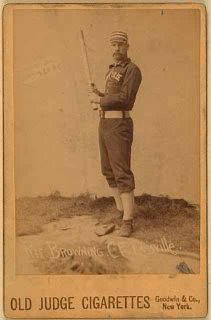
|
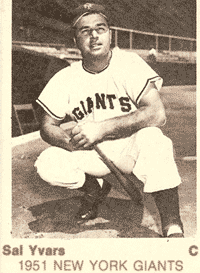
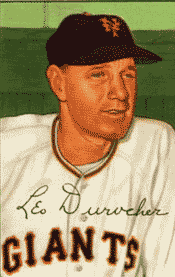
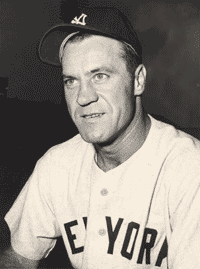
Hank Bauer |
Sal Yvars is among a handful of players who got exactly one at-bat in a World Series (which puts him ahead of Hall of Famers like Rod Carew and Ryne Sandberg). A backup C for eight years with the New York Giants and St. Louis Cardinals, Yvars got his chance in the 1951 Fall Classic against the Yankees.
- In his fifth year with the Giants, Yvars hit .317 in 25 games as backup to Wes Westrum.
- "I never got along with Leo [Durocher, Giants manager] because Leo had the most vulgar mouth and he treated guys like dirt and I didn't like him," Yvars recalled. "One time I threw shin guards at him, and he embarrassed the hell out of me in spring training." To make matters worse, Sal got into an argument with Durocher a month or so before the World Series.
- In the third game against the Yankees, Leo failed to use the right-handed hitting Yvars as a pinch-hitter against lefty Ed Lopat. When questioned by a reporter after the game, Leo said, "That kid is one kid who is not going to get into the World Series."
- When he learned of what his manager said, Sal confronted Durocher, who told him to get out of his office and go catch batting practice. "I was nasty as hell and broke all my bats because I knew I wasn't giong to get in."
But baseball, like life, doesn't always go as we expect. Fast forward to Game Six at Yankee Stadium with the Yanks leading three games to two. True to his promise, Durocher had not used Yvars in the Series.
- Yvars: "I was in the bullpen warming up Sal Maglie in the ninth inning when we were down, 4-1. We rallied to score two runs ... with the tying run on second and two outs. Leo then starts signaling for a pinch-hitter, and we had five guys down there who didn't know who he was calling for because the phones weren't working in the bullpen. ... So then a batboy runs out to the bullpen telling us Leo wants Yvars to hit."
- "I trot in from the bullpen. I go by third base where Leo was coaching, and he didn't say a word, except to report to the umpire that I was batting for Hank Thompson." Leo didn't want the left-handed Thompson to face southpaw reliever Bob Kuzava.
- "The batboy comes up to me and says, 'Mr. Yvars, you don't have a bat.' Believe me, I broke them all, so I tell him to pick one out for me."
- "I played against Kuzava two years in Triple A, so I was familiar with him. Anyway, I am at home plate getting a bat and didn't use the weight bat to loosen up and didn't even have batting practice before that game. ... And I'll never forget the umpire [Lee Ballanfant]. He says, 'Sal, good luck. Let's see you swing that bat.' I never heard that from any umpire."
- "So now I made up in my mind with the tying run on second, Kuzava ... was going to throw that fastball fading away. I used to be a pull hitter in the minors until I broke all my fingers, and I started to get smart by just trying to meet the ball."
- "I guessed right. Kuzava threw the fastball that tailed away from the outside corner, and I was trying to hit it right through the middle but instead hit a line-drive over the second baseman [Jerry Coleman] where RF Hank Bauer, who was playing close in, made a diving catch, rolled over and came up with the ball. That ended the World Series."
- "In the clubhouse, Leo came walking by and said, 'Tough luck, kid.' And I said a few words, thinking I was through with this club."
- But Yvars wasn't finished with the Giants. In 1952, he appeared in 66 games, his most ever. He was traded to the Cardinals during the 1953 season.
Reference: "Once-In-A-Lifetime," Bob Kuenster, Baseball Digest, January/February 2010 |
|
|
Hack Wilson is famous for driving home a record 191 runs in 1930 with the Chicago Cubs. But what is not usually known is that Hack came to the Cubs because of a blunder by the New York Giants front office that John McGraw rued for the rest of his career.
- Wilson played in three games for the Giants in 1923, then 107 in 1924. He showed promise when he replaced the injured Billy Southworth in CF, batting .295 with 57 RBI. Hack played in all seven games of the World Series, amassing a .233 average and 3 RBI.
- In 1925, after hitting only .239 in 62 games, Wilson was traded to Toledo, where he hit .343 in 55 games.
- In the off-season, because of a clerical error, Hack was not included on the Giants' list of protected minor league players.
- The Cubs took Wilson from Toledo in what was known as the "Rule 5 Draft."
Hack earned election to the Hall of Fame in 1979 because of the numbers he put up with the Cubs.
- He drove in 708 runs for Chicago from 1926 through 1930.
- Unfortunately, he succumbed to alcoholism at that point, and his productivity dropped sharply in 1931.
- That led to his trade to the Brooklyn Dodgers. After driving in 123 runs in 1932, he again fell off (the wagon and statistically) and retired after the '34 season.
|
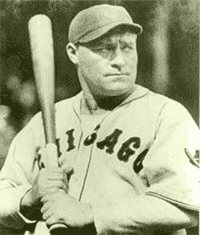
Hack Wilson |
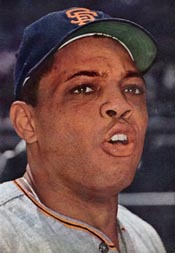 Willie Mays
Willie Mays
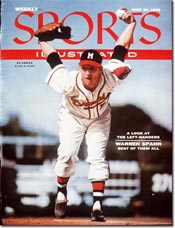
Warren Spahn
|
He Should Eat Barbecue Every Night
Willie Mays had gone hitless in the first two games of the San Francisco Giants' series in Milwaukee on April 28-29, 1961. To make matters worse, he ate some bad barbecue at dinner the second night, which kept him up all night.
- Willie told manager Alvin Dark to remove him from the lineup against Lew Burdette for the Sunday game on April 30 at County Stadium.
- "I didn't know if I could even swing," Mays recalls. "But during batting practice, ... Joey Amalfitano, he come up to me says, 'Try this bat.' And everything I hit was going out of the ballpark. So I said, 'O.K., I can play.'"
- And play he did, to the tune of four homers. At the time, Mays became the ninth man to accomplish the feat. He drove in eight runs. After the game, Willie naturally called it "the greatest day I ever had." The 13,144 who witnessed the feat would certainly agree.
- The first two clouts were hit off Burdette. The third came off Seth Morehead and the last off Don McMahon as the Giants romped 14-4.
- Mays says, "I should've had five. Aaron caught one ball that was going over the CF fence." The box score confirms that Hank was playing CF that day, which was not his normal position. And Willie did fly to center against Moe Drabowsky in the fifth, the only time the Braves retired him.
- Other Giants joined in the slugfest. SS Jose Pagan rapped two dingers, his first in the big leagues. Orlando Cepeda and Felipe Alou each added one to help Billy Loes coast to his second win of the season.
- The eight Giant homers tied the major league record for most in a game. Since they had hit five Saturday, SF also equalled the major league record of 13 in two consecutive games.
- Hank Aaron rapped two round-trippers to drive in all the Braves' runs. The ten HRs by the two clubs tied an NL record for one game.
The Giants had a field day at the expense of the Milwaukee staff in the last two games of the series. They certainly bounced back from the no-hitter that Warren Spahn threw against them on Friday night. Altogether, it was one of the more interesting series in baseball history. |
Reference: "Willie Mays, at 78, Decides to Tell His Story," Bruce Weber, The New York Times, January 31, 2010
|
|
Yankee-Red Sox Clashes – I
We tend to think of the Yankee-Red Sox rivalry as exploding in the 1970s and 80s. But the two teams had heated battles for decades before that. Sometimes the umpires got caught in the middle. Here's an example.
Monday, September 26, 1949
- Boston and New York met at Yankee Stadium in a makeup game before 66,156. Why such a large attendance? The two teams were in a flat-footed tie for first going into the last week of the season.
- Joe McCarthy's Red Sox had just beaten the Yankees two in a row at Fenway Park for their eighth and ninth straight victories.
- First-year manager Casey Stengel's Bronx Bombers took a 6-3 lead into the top of the eighth. However, the Sox rallied for four against ace reliever Joe Page.
- The play that ignited a furor was a squeeze bunt that plated the go-ahead run. Let the AP writer, Ralph Roden, tell the story.
Bobby Doerr bunted Johnny Pesky across with the big run. Doerr dropped the ball down the first base line. Tommy Henrich's throw had Pesky beat but Umpire Bill Grieve called Pesky safe. He said later the Red Sox runner slid under Yankee C Ralph Houk.
The Yanks immediately swarmed around Grieve like a bunch of hornets, claiming that Houk had blocked off Pesky. Houk, a major in the Rangers during the war, was the most enraged ...
- When Ellis Kinder shut down the home team the rest of the way, the Red Sox took a one-game lead with five to play, including two back at the Stadium on Saturday and Sunday.
- Afterwards, the Yankees, who besieged Grieve again as he made his way to the dressing room, were still boiling. OF Cliff Mapes, who witnessed the disputed play from the bench, asked Grieve, "How much did you have on the game?" with, as Roden put it, "added references as to Grieve's antecedents." Ump Charlie Berry had to pull Mapes away from Grieve, who insisted in his cubicle afterwards, "I called it as I saw it." Fellow arbiter Cal Hubbard backed him up.
- AL President Will Harridge later fined Houk and Stengel $150 each and Mapes $200.
- "Cinderella manager" Stengel was glum in his office after the game. Having never managed a team that finished higher than fifth, he feared his team was blowing his first pennant. His face showed every one of his 58 years and more.
- Since the Cardinals had also moved a game-and-a-half ahead of Brooklyn in the NL race, Roden started his story on the game like this.
The possibility was strong today that the nation's railroads—and not New York's famed subway system — will transport the participants in the 1949 World Series.
The right of way between Boston and St. Louis is the expected route of the series personnel instead of the hour ride via the underground from Ebbets Field to the Yankee stadium.
-
The Red Sox also announced that they were printing World Series tickets and sending applications to season ticket holders.
- However, as it turned out, the 1949 Fall Classic was a subway series after all as the Yankees and Dodgers pulled out their pennants on the last day of the season. And Casey Stengel not only got his first pennant, his Yankees won five straight World Series.
|
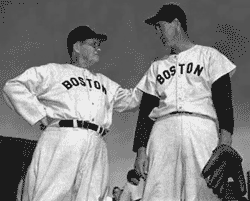
Joe McCarthy with Ted Willilams
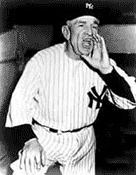
Casey Stengel
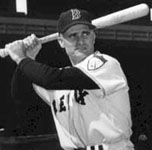
Bobby Doerr
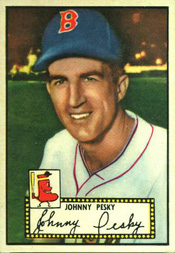
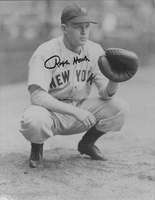
Ralph Houk |
|
Yankee-Red Sox Clashes – II
September 3, 1939: Fenway Park, Boston.
The Yankees had lost the "bruising opener" of the Sunday DH 12-11 for their seventh straight defeat at the hands of the Bosox. Now they had taken a 7-5 lead in the top of the eighth of the nightcap. However, they faced a more potent enemy than the home team – Boston's 6:30 curfew for Sunday games.
- CF Joe DiMaggio, who had not played in the first game because of a "slight knee injury," banged his 25th HR and two singles while RF Ted Williams, "sensational Red Sox rookie," whacked his 23rd and 24th round-trippers.
- Charlie Keller and DiMaggio opened the top of the eighth with singles, and Bill Dickey walked. George Selkirk then grounded into a force play at the plate, but 1B Jimmy Foxx dropped the throw for the attempted DP. This allowed DiMaggio to score the go-ahead run. Joe Gordon followed with a double driving in Dickey.
- With the clock showing 6:20, the Yankees attempted to speed up the inning while the Red Sox did just the opposite. SS-Manager Joe Cronin ordered 1B Babe Dahlgren to be intentionally passed, but Babe swung and missed the first pitch. In the meantime, Selkirk deliberately ran up the 3B line to be tagged out by C Johnny Peacock. On the second wide one, Dahlgren swung and missed again while Gordon wandered off third for the third out.
- Cronin argued that the Yankees were not playing properly. The crowd of 27,000 "added to the general confusion by showering the field with straw hats and pop bottles. This final demonstration carried the day, for in the few minutes remaining it was impossible to clear the playing field and Umpire [Cal] Hubbard, apparently holding the Boston club responsible for the delay, announced the forfeiture" of the game to the Yankees.
- Afterwards, Cronin filed a protest to the league office "on the ground that it was the Yankees who had played unfairly by deliberately running into put-outs at the plate and also trying to interfere with a perfectly legal intentional pass by having the batter swing at wild pitches."
Five days later, AL President Will Harridge upheld the protest and ordered the game to be replayed. It was rescheduled but never played because of rain. The contest had no effect on the pennant race, which New York won by 17 games over second-place Boston.
In 1943, the Massachusetts legislature passed a bill that rescinded the Sunday curfew for the remainder of World War II.
Reference: "Fans Litter Field, Then Umpire Acts," by John Drebinger,
New York Times, 9/4/1939 |
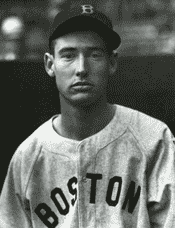
Ted Williams
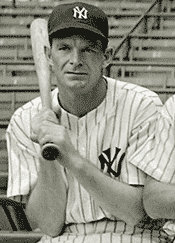
George Selkirk
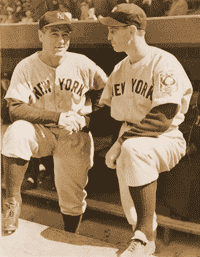
Lou Gehrig and
Babe Dahlgren
|
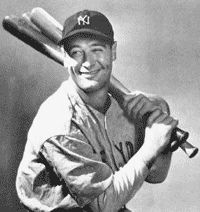
Lou Gehrig
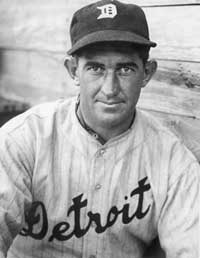
Mickey Cochrane
|
Lou Gehrig was one of the greatest hitters in baseball history. The Yankee first-sacker pounded out:
- 534 doubles,
- 163 triples, and
- 493 HR.
Yet, his 17-year career included several instances of lost hits, both of which occurred at Griffith Stadium, Washington.
- In April 1931, Lou hit the ball into the stands with teammate Lyn Lary on base. However, the ball bounced back into the field and, when Lary saw a Senators OF catch the ball, he thought the inning was over and went from 3B to the dugout rather than complete the circuit. Gehrig was ruled out for passing Lary and credited with only a triple. Larrupin' Lou went on to tie teammate Babe Ruth for the HR title that year with 46.
- On June 29, 1934, the Yankees played an exhibition game in Norfolk VA. Gehrig was knocked unconscious by a beanball. He was taken to a local hospital where X-rays revealed no serious damage. It was feared that his streak of 1,414 consecutive games was in jeopardy. But he made the overnight trip to Washington and started at 1B as usual. In the first inning, he knocked in Frank Crosetti and Ruth with a twisting triple to left that got by Heinie Manush. In the third, Lou hit another three-bagger and scored on Myril Hoag's single. In the top of the fifth, Gehrig tripled again. Heavy winds came up when the Senators were batting in the bottom of the fifth, trailing 4-1. There was dust that sent the fans scurrying for shelter, and then rain. After a delay of more than an hour, umpires Bill McGowan and Brick Owens called the game. About 7,000 fans got rain checks, but Gehrig had his triples wiped off the books, undoubtedly the only time in MLB history that a player lost three triples to the weather. He would have tied the AL record of 3 in a game and had a chance to get a fourth to break the record.
- Lou also has the unenviable distinction of being one of three players who failed to win the MVP award after a Triple Crown season. C Mickey Cochrane, manager of the 1934 AL champion Detroit Tigers, earned the MVP crown despite Gehrig's leading the league with a .363 average, 49 HRs, and 165 RBI as the Yankees finished second, seven games behind.
- The other Triple Crown winners who failed to be MVP? Ted Williams of the Red Sox twice, 1942 (Yankees 2B Joe Gordon MVP) and 1947 (Yankees CF Joe DiMaggio MVP), and Chuck Klein of the Phillies in 1933 (Giants P Carl Hubbell MVP).
|
Two HRs And They Pinch-Hit for Me!
Randy Lerch had been an All-American OF/P at Cordova (CA) High School when the Phillies drafted him in the eighth round in 1973.
- Randy came up to the Phils in 1975. He had the most wins of his 11-year ML career in 1978, when he won 11. It's the last of those eleven victories that occupies us here.
- Lerch faced Pittsburgh on September 30, 1978, on the second-to-last day of the season. Philadelphia's four-game lead in the East Division at the beginning of the week had dwindled to only 1.5 over the Pirates, whom they were facing at Three Rivers Stadium. Still, one more win would clinch the division for Danny Ozark's Phillies.
Lerch got off to a shaky start.
- 1B Willie Stargell hit a grand slam in the first inning to give the Pirates a 4-1 lead.
- Lerch whacked a HR with two out and no one on in the top of the second to cut the deficit to two. Randy recalls: "I knew Willie, and it was one of those days in batting practice when I was really hitting a lot of balls out of the park, and Willie told me later on that he told the Pirates' starting P, Don Robinson, to be careful pitching to me because I was swinging the bat good in BP. Robinson responded by saying, 'Forget it, he can't hit.' And Willie told me that after the first HR, he went to the mound to talk to Robinson and said, 'You know what, I told you, this guy can hit so be careful.'"
- It was deja vu all over again when Lerch came to bat with two out and none on in the fourth and slammed another four-bagger. Stargell visited Robinson on the hill again, but this time the hurler beat Willie to the punch: "That ---- can hit!"
- Meanwhile, Randy had found his grove on the mound and held the Pirates scoreless for four straight innings. However, still trailing 4-3, Ozark sent Jose Cardenal to hit for Lerch to lead off the sixth. "It made me mad," Randy remembers. "Cardenal pinch-hit for me and the Pirates' Grant Jackson struck him out. That didn't make me a happy camper. It was something I couldn't believe because it would have given me the chance to have an all-time game. If I had done something in that situation, wow! It would have been something special. But we'll never know."
- LF Greg Luzinski smacked a three-run HR in the inning to give the Phils the lead for good. They added four in the 8th that helped them survive another four-run inning by the Pirates in the ninth.
Philadelphia clinched the East pennant but lost the NL pennant 3 games to 1 to the Los Angeles Dodgers.
Reference: "Pitchers Recall Two-HR Games," Bob Kuenster,
Baseball Digest, May/June, 2010 |
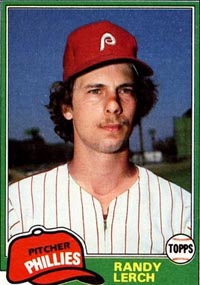
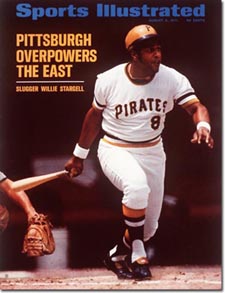
Willie Stargell
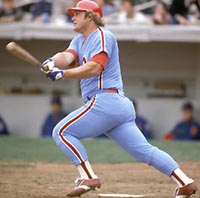
Greg Luzinski |
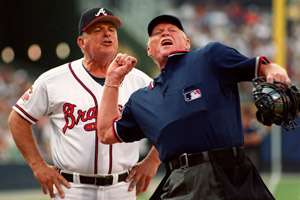 Bobby Cox being ejected
Bobby Cox being ejected
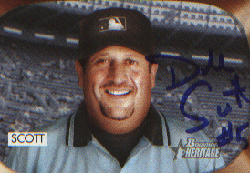
Dale Scott
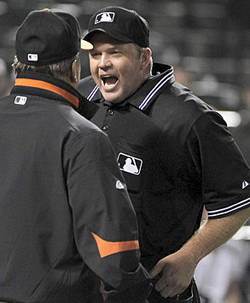
Ron Kulpa | If All Else Fails, Try Humor
Atlanta manager Bobby Cox holds the dubious distinction of having been ejected from more games than any other manager in history. His 154 ousters entering the 2010 season – his last before retirement – broke John McGraw's record.
- Although umpires can do without Bobby's tirades, they don't have the animosity toward him that they had toward Earl Weaver or Billy Martin.
- 25-year umpire Dale Scott says, "I really respect Bobby, and although I don't know if he actually likes any umpires, he respects us back."
- Scott adds: "It's a given he's going to get into his situations with us, but his players know that if there's a problem with the umpires, he'll take care of it. You'll notice with the Braves there aren't a lot of player ejections."
Scott tells the story of an incident where he gained respect for Cox.
It was a mistake by Bobby that touched off my most memorable exchange with him. A Braves batter hit a little pop fly down the RF line that my partner Ron Kulpa called foul. Bobby came storming out of the dubout to argue, to no avail.
Exasperated, he turned to me and yelled, "Come on, Sam! You know he missed it!"
Ron said, "Um, Bobby? His name is Dale." What happened next was painfully funny because all three of us were trying so hard not to laugh – the cameras were on. Several seconds went by before Bobby finally said: "Oh God, I'm sorry." I told him it was all right; I'd been called worse things. Then he deadpanned, "I'm sure you have." It was absolutely hilarious.
Reference: "Umpire's Worst Enemy," Sporting News, 5/24/2010
|
On Saturday, May 1, 1920, the Brooklyn Robins and Boston Braves played one of the most famous games in history. Furthermore, the contest began a grueling three-day odyssey for the Robins.
- That game was called by darkness after 26 innings with the score tied 1-1. Amazingly, both pitchers, Joe Oeschger of the Braves and Leon Cadore of the Dodgers, went the distance! The duel lasted 3 hours and 50 minutes, an inordinately long time for that era when nine-inning games were routinely completed in under two hours. It remains the longest game in number of innings in major league history.
- As usually happens, the marathon took its toll on some batting averages. SS Chuck Ward of the Robins went 0-10 while 2B Charlie Pick of the Braves went him one better: 0-11.
- Cadore did not pitch again for the Robins until May 9. Oeschger had even more rest, returning to the mound May 13.
- Because Sunday baseball was banned in Boston, the Dodgers took a train back to Brooklyn where they faced the Philadelphia Phillies the next day in a one-game series. Philadelphia's "blue laws" also prohibited Sunday sporting events.
- As luck would have it, the Robins toiled another 13 frames before the Phillies prevailed, 4-3. This time George Smith of Philadelphia outdueled Burleigh Grimes of Brooklyn.
- The Robins then boarded another train back to Boston. On Monday, the two teams tied up in another marathon with the Robins losing 2-1 in 19 innings. Once again, the starters persevered the whole way: Sherry Smith for Brooklyn and Dana Fillingim for Boston.
Smith returned to action 17 days later. Fillingim, however, pitched a 3-2 victory at St. Louis on May 11.
- Mercifully, the weary Robins enjoyed an off day May 4 before opening a three-game series with the New York Giants at the Polo Grounds.
So the Dodgers played 58 innings in three days with only a tie and two losses to show for it. To make matters worse, when the 26-inning tie was replayed on June 25, the Braves won 5-2.
However, Wilbert Robinson's Dodgers got the last laugh when they won the NL pennant by 7 games.
Reference: "Shouldn't There Be a Curfew?," Bob Broeg, Baseball Digest, June 1968
|
|
|
|